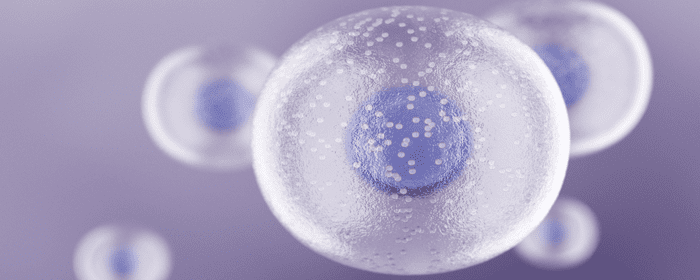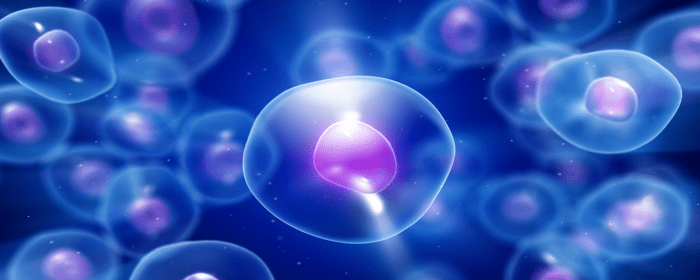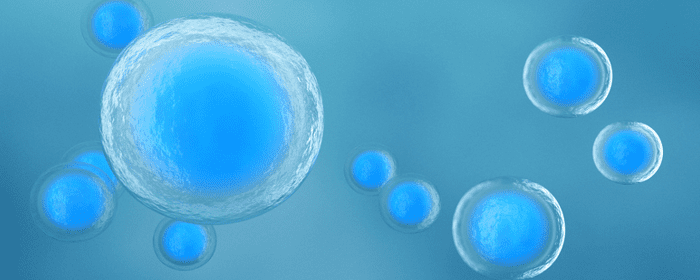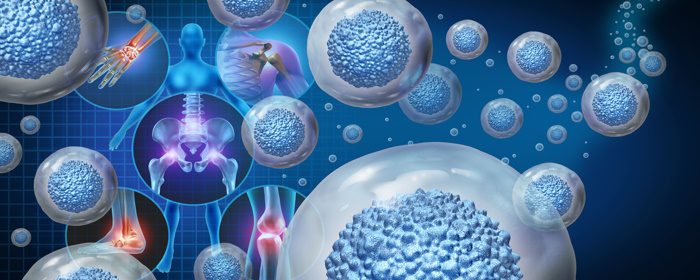
by admin | Mar 1, 2023 | Mesenchymal Stem Cells, Stem Cell Research, Stem Cell Therapy
Osteoporosis is a common bone disease that occurs as a result of the body’s inability to create new bone as fast as the body is losing bone. Characterized by progressively weakened bones and decreased bone density over time, osteoporosis often results in fractures of the wrist, hip, or spine.
Currently, it is estimated that 10 million Americans have osteoporosis and an additional 44 million have low bone density considered significant enough to increase the risk of developing osteoporosis. Recent studies indicate that roughly 50% of women and 25% of men over the age of 50 will break a bone as a result of osteoporosis[1].
While traditional methods of managing osteoporosis include medication, regular participation in weight-bearing exercises, and eating a healthy diet, the condition cannot be cured through these current approaches. Recently, regenerative medicine, also known as stem cell therapy, has drawn attention as a potential new approach to regenerate bone tissue and as a way to treat osteoporosis.
Specific stem cells, known as mesenchymal stem cells (MSCs), are widely considered to be the most promising of all stem cells for regenerative applications – primarily because of their anti-inflammatory, immune-privileged potential and less ethical concerns than other forms of stem cells.
In this review, Arjmand et al. consider all the currently known effects of stem cell-based therapies, including MSC-based therapy, in the treatment of osteoporosis. Several studies have confirmed the relationship between osteoporosis and a clear reduction in endogenous MSCs’ ability to proliferate, differentiate, and ultimately form new bone. Considering this, MSCs have been the most common type of stem cell investigated for the treatment of osteoporosis in both animal models and humans.
The authors point out several advantages of using MSCs in clinical models, including their accessibility and ease of harvesting, immunosuppressive outcomes, and ability to differentiate. Arjmand et al also highlight evidence that indicates MSCs to be effective in this application most likely as a result of their paracrine effects and their supporting regenerative microenvironment ability and not solely a result of their ability to differentiate. Considering these observed paracrine effects, the authors believe MSC transplantation could open a host of new opportunities for the treatment of osteoporosis.
This review concludes by calling for further studies into stem cell therapy as a potential treatment for osteoporosis specifically to understand the outcome and biodistribution of MSCs after transplantation and to further identify important bone loss signaling pathways and genes specific to each individual.
Source: “Prospect of Stem Cell Therapy and Regenerative Medicine in … – NCBI.” 3 Jul. 2020, https://www.ncbi.nlm.nih.gov/pmc/articles/PMC7347755/.
[1] “Learn What Osteoporosis Is and What It’s Caused by.” https://www.bonehealthandosteoporosis.org/patients/what-is-osteoporosis/. Accessed 1 Feb. 2023.

by admin | Feb 15, 2023 | Spinal Cord Injury, Mesenchymal Stem Cells, Stem Cell Research, Stem Cell Therapy
Spinal cord injury (SCI) often results in damage to the spinal cord or the nerves found within the spinal column. Currently estimated to affect over 17,000 new patients each year in the United States, with 81% of these patients being male, the most common causes of SCIs are motor vehicle accidents, falls, acts of violence, and sports/recreational activities.
Current SCI treatment methods are unable to support the regeneration of the spinal cord and often lead to permanent nerve damage that affects motor and sensory function. The nature of SCI injuries often leaves patients unable to function at pre-injury levels and results in significant impacts on issues related to physical, mental, and socioeconomic health.
As more is learned about the potential benefits of regenerative medicine in the regeneration and repair of damaged cells and tissue, mesenchymal stem cells (MSCs) have emerged as potential candidates for the therapy management of SCIs; primarily because of their ability to release bioactive factors, their antiapoptotic effects, ability to inhibit scaring, and their ability to produce angiogenic effects.
Fracaro et al.’s review provides information about the damage from primary and secondary events after SCI, traditional treatments, and results of pre-clinical and clinical trials examining the use of MSCs as an SCI-tissue regeneration strategy.
Before sustaining an SCI, a wide range of inflammatory cells – all except for microglia – are found in blood vessels and throughout the spinal cord. Upon injury, it is common to observe immediate neuronal and glial death at the site of the injury followed by the development of an inflammatory process in the vascular and medullary region; it is this secondary response that results in the deterioration of the spinal cord and a general worsening of the condition. In the weeks and months following injury, remaining neutrophils and lymphocytes are found in the intravascular region, inactivated microglia remain in white matter, and macrophages are found in gray matter.
Traditional SCI treatments have demonstrated an inability to completely regenerate nervous tissue. Most of these traditional treatment methods attempt to reduce side effects and protect injured nerve tissue. Commonly used SCI treatments frequently include decompression surgery to relieve pressure and reduce hypoxia and ischemia; intravenous application of methylprednisolone sodium succinate (MPSS) to inhibit lipid peroxidation; neuroprotective agents to reduce cell dysfunction and death; and electrostimulation as a way to inhibit inflammation and reduce secondary injuries.
Despite the different techniques mentioned above, cell-based therapy is the only promising treatment aimed at regeneration. Stromal cells, and specifically MSCs, have demonstrated the potential for self-regeneration, differentiation, and immunomodulation. Although research has yet to determine exactly how MSCs promote functional recovery after SCI, they are widely thought to work through secreting different factors and biomolecules. MSCs have also demonstrated the ability to reduce inflammation, which is a very common secondary event occurring after SCI trauma.
The authors conclude this review by pointing out that a better understanding of the regenerative effects of stromal cells in the nervous system is required in order for the future development of cell-based therapies for patients with SCI.
Source: “Mesenchymal stromal cells as a choice for spinal cord injury treatment.” https://www.oaepublish.com/neurosciences/article/view/3329.

by admin | Feb 4, 2023 | Stem Cell Therapy, Degenerative Disc Disease, Mesenchymal Stem Cells, Stem Cell Research
Currently, it’s estimated that over 40% of adults over the age of 40 have at least one degenerative disc in their vertebrae; by age 80, the percentage afflicted with this condition is estimated to be over 80%. Characterized by erosion of the rubber-like discs between each vertebra of the spine, degenerative disc degeneration often results in chronic and debilitating back and neck pain. The condition is commonly accompanied by prolonged numbness in the arms and legs and pain that tends to radiate downward through the lower back and buttocks.
Adding to the seriousness of degenerative disc disease is the fact that chronic back pain continues to be a significant public health issue and among the leading causes of lost days of work and one of the most widely reported symptoms contributing to a diminished quality of life. In fact, a study conducted by the University of Maryland Medical Center found that the total cost of back pain (when factoring in medical costs, lost days of work, and the condition’s impact on wages) amounts to a staggering $560 to $635 billion annually.
Historically, chronic cases of degenerative disc disease required surgery. Unfortunately, surgical treatment of this condition not only demonstrated an inability to completely correct the conditions but also produced additional biomechanical problems and accelerated degeneration of nearby discs and portions of the spine.
Considering this, researchers began to investigate the potential use of autologous and allogeneic mesenchymal stem cells (MSCs) as options for treating degenerative disc disease.
In this review, Noriega et al. provide follow-up findings as a result of their long-term randomized controlled trial using allogeneic bone marrow-derived MSCs. As part of this trial, participants in the treatment group received an intradiscal injection of healthy allogeneic bone marrow MSCs while those in the control group received sham infiltration in the paravertebral musculature.
Outcomes of this trial were followed and recorded for one year after injection and subsequently followed up on 3.5 years afterward as part of this review.
As part of the original study and in addition to confirming the feasibility and safety of degenerative disc treatment with injection of MSCs, Noriega et al. found that patients treated with MSCs demonstrated rapid and significant improvements in algo functional indices when compared to those in the control group.
Examining outcomes nearly 3.5 years after original interventions, the authors reported no serious adverse effects of the investigation for either the treatment or control group. Findings also indicated that the improvements in both pain relief and disability improvement continued to increase in those receiving MSC injections while control patients did not show any significant healing after 3.5 years of receiving the intervention.
Of particular interest, the authors noted that patients treated with MSCs showed two distinct patterns – one subpopulation that showed a significant response to this treatment (responders) and another subpopulation that demonstrated no significant difference from patients in the control group (non-responders).
Noriega et al. also reported that observed structural changes in those receiving MSC injections occurring after year one of treatment were maintained over the period of 3.5 years while those in the control group continued to show a decrease in grading used to measure results of the trial.
The authors conclude that these long-term outcomes support the use of MSCs as a valid alternative for managing degenerative disc disease. Findings indicate that MSC injection as a treatment for degenerative disc disease provides effective and durable pain relief and objective improvements in disc degeneration.
Source: “Treatment of Degenerative Disc Disease With Allogeneic … – PubMed.” 1 Feb. 2021, https://pubmed.ncbi.nlm.nih.gov/33492116/.

by admin | Jan 5, 2023 | Mesenchymal Stem Cells, Diabetes, Regenerative Medicine, Stem Cell Research, Stem Cell Therapy, Umbilical Stem Cell, Wharton's Jelly
Mesenchymal stem cells (MSCs) are multipotent fibroblast-like cells found throughout the body and have been found to have self-renewing and multilinear therapeutic potential by providing new cells for tissue repair by replacing damaged cells.
Thought to stimulate repair and control the immune response through an expression of growth factors and other cytokines, MSCs are at low risk of rejection and repair tissue damage through immunomodulation, not by their ability to differentiate.
While MSCs can be isolated from a number of tissue sources, including bone marrow, peripheral blood, adipose (fat) tissue, umbilical cord blood, and umbilical cord tissue (Wharton’s jelly). MSCs derived from the human umbilical cords (UCMSCs) have been found to have significant advantages over MSCs isolated from other sources. These advantages include higher proliferation and self-renewal capacity and multilineage differentiation capability.
Unlike many sources of MSCs, the umbilical cord is considered medical waste, making the collection of UCMSCs noninvasive and eliminating ethical concerns associated with the collection of MSCs from other sources. These UCMSCs have been developed as effective “off-the-shelf” cell therapy for a number of conditions, including autoimmune diseases, and as a treatment for a number of emergency medical conditions.
This Phase 1 clinical study, designed and conducted by Chin et al., intended to determine the safety and efficacy of intravenous allogeneic infusion of UCMSCs in healthy volunteers and to determine the effective dose at which an immunomodulatory effect is observed. The findings of this study are intended to serve as a guideline and benchmark for future CVL-100 clinical research.
Analyzing the results of this clinical study, the authors report that there was no observed complication resulting from the infusion and no significant adverse event in either dosage group in the 6 months of follow-up. These findings led Chin et al. to conclude that UCMSCs infusion was safe among healthy subjects, results that were consistent with other UCMSC treatment-based studies.
The authors also reported that UCMSCs infusion posed no significant adverse effects in patients with type 2 diabetes. Despite the relatively small sample group of this study (11 subjects), the authors reported demonstrating an initial transient proinflammatory effect followed by a significant and prolonged anti-inflammatory effect.
In addition, Chin et al. report found that high-dose (HD) CLV-1000 infusion provided a significant increase in both hemoglobin level and MCV level that falls within the normal range. Biomarker assessment results also indicated that the HD group demonstrated a significant steady increase of cytokine IL-1RA from baseline up until 6 months of posttreatment. This finding is especially important as IL-1RA is a naturally occurring antagonist to the proinflammatory cytokine 1L-1.
The authors conclude that this study clearly demonstrates a difference in immunomodulatory effect between the high-dose and low-dose treatment groups, with the HD group demonstrating a significantly greater reduction of proinflammatory cytokine TNF-α and an increased level of specific anti-inflammatory cytokines within 6 months and in relation to those in the low dose group. Considering this, Chin et al. conclude that a CLV-100 dosage of two million MSCs per kilogram of body weight represents the optimal dose level for overcoming inflammatory conditions by displaying the best improvement in all parameters tested, absence of side effects, and SAEs.
The data collected in this study also suggests that this is the first study to report a significant reduction of globulin observed over the course of the study. This is important because globulin serves an important role in immunity. Additionally, increases in serum globulins are associated with several immune-mediated diseases, including rheumatoid arthritis, chronic liver disease, diabetes mellitus, and cancer.
Considering these findings, the authors of this study conclude that high doses of allogeneic MSCs could help exert beneficial effects of repair and healing.
Source: “High Dose of Intravenous Allogeneic Umbilical Cord-Derived ….” https://www.hindawi.com/journals/sci/2020/8877003/.

by admin | Dec 20, 2022 | Osteoarthritis, Mesenchymal Stem Cells, Stem Cell Research, Stem Cell Therapy
Osteoarthritis (OA) is the most common form of arthritis and affects an estimated 25% of adults in the United States. Characterized by pain, stiffness, and inflammation in the joints of the body, OA is most frequently observed in the knees, hands, hips, and spine.
OA is one of the leading causes of disability with an annual cost of medical care and lost earnings exceeding $300 billion. With over 250 million people affected by OA worldwide, the combination of aging, obesity, and increased incidents of oxidative stress is causing the condition to become increasingly prevalent.
To date, treatment and medical interventions – including exercise, physical therapy, lifestyle modifications, and prescription and over-the-counter medications – have been successful in managing symptoms, reducing pain, and maintaining joint mobility, but have not been able to promote the regeneration of degenerated tissue.
Stem cells, and specifically mesenchymal stem cells (MSCs), have been identified as a potential therapy option for OA. In this review, Zhu et al. summarize the pathogenesis and treatment of OA and review the current status of MSCs as a potential treatment option for the condition.
In reviewing the pathogenesis of OA, the authors highlighted the fact that OA is a dynamic and progressive degenerative disease that is primarily caused by the imbalance between restoration and destruction of the joints; the disease is also significantly influenced by environmental, inflammatory, and metabolic aspects.
The authors highlight that the primary goals of current OA treatment methods are to reduce pain, slow progression, and preserve and improve joint mobility and function.
As researchers continue to search for therapies that encourage the regeneration of damaged articular cartilage and the alleviation of inflammation, they’ve turned their attention to a number of stem cell-based therapies, such as autologous chondrocyte implantation (ACI). While ACI has received FDA approval, unexpected dedifferentiation, and joint invasiveness during harvest limit the availability and usefulness of this application.
Fortunately, MSCs have not been found to demonstrate limitations similar to those observed in ACI and are considered novel therapeutic agents for the treatment of OA. Prized primarily for their ability to stimulate cartilage formation and for their vascularization, anti-inflammation, and immunoregulation, MSCs are sourced from different types of stem cells, including bone marrow (BM-MSCs), adipose tissue (AD-MSCs), and umbilical cord (UC-MSCs). Zhu et al. summarize the characteristics, advantages, and disadvantages of each of these MSC sources in this review.
The authors point out that several clinical trials have proven both the safety and potential efficacy of BM-MSCs, AD-MSCs, and UC-MSCs in the treatment of OA. However, the authors also point out that several of these trials were conducted with limited samples, without rigorous controls, and with relatively short-term follow-up. Considering this, Zhu et al. call for additional clinical trials using larger samples, more rigorous controls, and additional long-term follow-up. In addition, the authors also call for additional considerations to further enhance the efficacy in clinical trials, including cell density, time and location for MSC transplantation, and pretreatment of MSCs by inflammatory cytokines.
The authors conclude that while stem cell-based therapy, and specifically MSCs, demonstrate great potential for the regeneration of new cartilage and strong immunoregulatory capacity, the identified limitations and risks of MSC-based therapy should be realized and treated carefully.
Despite the identified risks and limitations, MSC-based therapy for the treatment of OA might achieve better efficacy in regenerative medicine, especially when administered in combination with other treatment options.
Source: “Mesenchymal stem cells in osteoarthritis therapy: a review – NCBI.” 15 Feb. 2021, https://www.ncbi.nlm.nih.gov/pmc/articles/PMC7868850/.

by admin | Dec 6, 2022 | Mesenchymal Stem Cells, Stem Cell Research, Stem Cell Therapy
Mesenchymal stem cells (MSCs) have been widely used in a number of applications designed to aid in the regeneration and healing of human tissue. Prized for their multipotent capacity to differentiate into a variety of other specific cell types, MSCs have consistently demonstrated the ability to seek out damaged tissue while also reducing inflammation and promoting healing.
Recently, the discovery of a specific type of MSC known as circulating mesenchymal stem cells has demonstrated increased potential for the use of MSCs in the regeneration, repair, and engineering of tissue throughout the body.
Circulating MSCs demonstrate characteristics similar to MSCs that are derived from bone marrow and are typically found in very low concentrations in healthy individuals. While these specific MSCs have demonstrated the ability to migrate to the site of damaged or injured tissue like other MSCs, what makes circulating MSCs so interesting to researchers is their distinct genetic profile – especially when compared to bone marrow-derived stem cells (BM-MSCs).
Xu and Li’s review provides a summary of the basic knowledge of circulating MSCs, their potential clinical applications, and the issues of using allogeneic MSCs for clinical therapy.
While these circulating MSCs, also known as peripheral blood-derived MSCs (PB-MSCs), have great potential in the field of tissue engineering and regeneration, they are found in very low quantities within the human body. As a point of reference, Xu and Li point out that the frequency of BM-MSCs in humans under normal conditions is very low and ranges from 1 in 104 to 1 in 105. Compared to BM-MSCs, the concentration of circulating MSCs is even lower, typically around 1 in 108.
Despite their low numbers, researchers have successfully identified and collected PB-MSCs in both animal and human models. In both scenarios, PB-MSCs demonstrated characteristics of cell proliferation and multi-differentiation potential that are similar to those observed in BM-MSCs. In addition, and adding to their potential, PB-MSCs are plastic-adherent, have multi-differentiation potential, and demonstrate the ability to differentiate into a variety of cells.
Adding to the benefits described above, and unlike stem cells harvested from embryonic sources, PB-MSCs are not attached to ethical concerns. In addition, numerous research studies have demonstrated the use of MSCs in a variety of applications, including cardiovascular, bone, and cartilage repair have resulted in general significant improvements in tissue healing and regeneration.
To date, studies specific to circulating MSCs are rare. However, Xu and Li highlight that circulating MSCs, while originally found in the bone marrow and other sources throughout the body, are a special subset of MSCs found in circulation. While additional study is required, early research seems to indicate that the release of these circulating MSCs is tightly controlled by a variety of systematic and local factors, including inflammatory cytokines, hormones, and a variety of growth factors.
There is increasing evidence that indicates MSCs are immunosuppressive cells and that allogeneic MSCs may be used with similar therapeutic efficacy to autologous MSCs. Considering this, Xu and Li conclude that allogeneic transplantation seems to be more promising and a way to ensure that patients can receive treatment at the best time and without significant fear of rejection.
As research continues to explore the potential benefits and drawbacks of circulation MSCs, the authors point out that a lack of standard procedures for therapeutic MSC administration remains a critical issue for the clinical application of MSCs. These critical issues need to be addressed through carefully designed animal and clinical trials before clinical applications of MSCs can be used in patients with certain diseases.
Source: “Circulating mesenchymal stem cells and their clinical implications.” https://www.sciencedirect.com/science/article/pii/S2214031X1300048X.







 St. Petersburg, Florida
St. Petersburg, Florida
